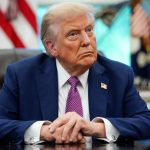The United States has cut its imports of Nigerian goods by more than 40 per cent in just one month, heightening concerns about the fragile nature of Nigeria’s trade relationship with one of its most strategic partners.
Fresh figures from the US Census Bureau and Bureau of Economic Analysis show that imports of Nigerian goods dropped from $639m in June 2025 to $379m in July—a staggering 41 per cent decline.
The collapse in imports coincided with a sharp fall in US exports to Nigeria during the same month, from $919m in June to $584m in July. Despite the dip in exports, Washington still recorded a surplus of $206m in July compared with $280m in June.
Between January and July 2025, America exported goods worth $3.92bn to Nigeria while importing $3.14bn in return, leaving the US with a year-to-date surplus of $781m. But July’s steep contraction in Nigerian exports underlines a significant weakening in Nigeria’s traditional surplus position and its broader access to the American market.
While Nigeria’s position has deteriorated, the broader African trade landscape presents a mixed picture for Washington. US imports from Africa surged to $4.47bn in July, up from $3.67bn in June, while exports slipped slightly from $3.37bn to $3.30bn.
That shift left America with a trade deficit of $1.17bn in July, compared with a smaller $302m deficit the month before. So far in 2025, US exports to Africa stand at $22.98bn, while imports from the continent are valued at $27.84bn, leaving Washington with a net deficit of $4.86bn.
A country-by-country breakdown shows diverging fortunes. US trade with Egypt remains in surplus, with Washington exporting $847m in July against imports of $290m, producing a positive balance of $557m. In contrast, trade with South Africa deepened America’s deficit as imports from the country hit $1.99bn while exports stood at only $565m, creating a monthly shortfall of $1.42bn. Cumulatively, Washington’s deficit with South Africa has reached $7.74bn.
Algeria and a number of smaller African economies have also widened America’s deficit as imports outpace exports. The steep drop in Nigerian exports to the United States comes in the wake of renewed trade measures under US President Donald Trump.
In late July, Trump signed an executive order raising tariffs on Nigerian exports from 14 per cent in April to 15 per cent, under his “reciprocal” tariff regime targeting countries that run surpluses against the US Although crude oil—the backbone of Nigeria’s exports—has been exempted in some instances, uncertainty over tariff implementation has dampened US import demand, especially for non-oil goods that are now directly affected by higher duties.
For Washington, the move is part of a broader recalibration of trade policy designed to shield domestic industries and reduce global trade imbalances. But for Nigeria, the immediate outcome is shrinking access to a key market and erosion of its once-comfortable surplus with the US.
Nigeria’s Minister of Industry, Trade and Investment, Jumoke Oduwole, said the country would not be stampeded into retaliatory action but would continue on its path of reform and diversification. “Nigeria remains responsive; we’re not reacting. We’re focused on the eight-point agenda of President Bola Tinubu. We will continue to support domestic investors and expand market access for Nigerian businesses,” Oduwole said.
She noted that while the United States remains an important trade partner, Nigeria is strengthening its African Continental Free Trade Area strategy and boosting non-oil exports, which grew by 24 per cent year-on-year in the first quarter of 2025.
“It’s mostly an energy trading relationship, but we are waiting to see what happens with AGOA (African Growth and Opportunity Act) in September. We are also growing exports to other African countries and expanding partnerships with Brazil, China, Japan, and the UAE,” she added.
The minister stressed that Nigeria would seize opportunities for South–South cooperation, pursue export diversification, and reduce dependence on the American market.
Development economist and Chief Executive Officer of CSA Advisory, Dr Aliyu Ilias, said Nigeria should view the current trade situation as an opportunity to adapt. “I think it’s a good time that this is happening to Nigeria. Trump’s tariff is not only for Nigeria. The advantage is that we are now exporting more overall, which is positive for us,” he said.
Ilias argued that Nigeria could use its position within BRICS and other international alliances to reduce vulnerability and build resilience. He added that with other countries such as India and China also facing US tariffs, Nigeria had an opening to forge new partnerships.
“We also have to start being on our own. We can trade with other partners and see, because other partners are also looking for partners. The tariff that is affecting us is also affecting others, so it may be a good opportunity,” he added.
Similarly, renowned economist and Chief Executive Officer of the Centre for the Promotion of Private Enterprise, Dr Muda Yusuf, downplayed the impact of the US tariffs on Nigeria. “Our trade with the US is not that strategic. When anything goes wrong, it is not as if it can have any fundamental effect on our economy. Our trade exposure to them is very limited,” Yusuf explained.
He noted that Nigerian exports to the US are dominated by crude oil and a handful of other commodities such as fertilisers, making the country’s trade profile narrow and underdeveloped in non-oil areas. Yusuf added that Nigeria’s tariff exposure is relatively moderate compared with other countries. However, he identified another challenge beyond tariffs: US visa policy.
“The bigger challenge for Nigeria’s trade relationship with the U.S. is Washington’s visa policy. Barriers to travel limit business interactions and investment inflows. That is more critical than tariffs in the long run,” he said.
While Nigeria’s exports to the US are shrinking under the weight of new tariffs, the consensus among policymakers and economists is that the setback could accelerate long-overdue diversification. With AfCFTA integration, rising non-oil exports, and growing trade partnerships with Asia, the Middle East, and Latin America, Nigeria is positioning itself to cushion the effects of America’s recalibration.
The immediate challenge remains significant—July’s figures underscore the vulnerability of Nigeria’s reliance on energy exports and its dependence on US markets. Yet, officials insist that the country’s economic reforms and strategic partnerships will gradually tilt the balance in Nigeria’s favour.
For now, the collapse in US imports from Nigeria serves as both a warning and an opportunity: a warning of how exposed Nigeria remains to external shocks, and an opportunity to redefine its trade relationships for a more resilient future.









